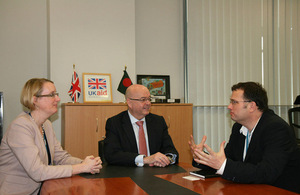UK support to the clean-up effort in the Sundarbans world heritage site
The UK funded adviser Mark Whittington arrived in Dhaka today and will work with the Bangladesh Government and UN to implement recommendations made by a recently completed assessment in the Sundarbans.

The UK funded advisor Mark Whittington (Right) today met with the British High Commissioner Robert Gibson and DFID Bangladesh Country Representative Sarah Cooke upon arrival.
The British High Commission Dhaka is pleased to announce UK support to the clean-up operation in the Sundarbans world heritage site following an oil-spill on 9 December. The Sundarbans, one of the world’s largest mangrove forests, is an area of global environmental importance and is home to a range of endangered species of animals including the Bengal tiger and Irrawaddy dolphin. The Sundarbans also provides south-west Bangladesh with a natural buffer which helps to lessen the impact of cyclones and storm surges and so is of national importance.
At the request of the UN and the Government of Bangladesh, the UK will provide an expert adviser to support the oil-spill clean-up activities. The UK funded adviser (Mark Whittington from the International Tanker Owners Pollution Federation Limited) arrived in Dhaka on 7th January and will work with the Government of Bangladesh and UN to implement recommendations made by a recently completed assessment in the Sundarbans. British High Commissioner to Bangladesh Robert Gibson stated:
‘the Sundarban is a UNESCO World Heritage Site, and is very special to the people of Bangladesh and we are all responsible to protect it. I am pleased that the UK can provide support with the expertise of Mark to assist the Bangladesh government in tackling the incident. This is a clear example of the UK’s ongoing support to the government of Bangladesh for coordinated planning and response to disasters.’
Notes
Mr Mark Whittington is as an ITOPF (The International Tanker Owners Pollution Federation Limited) expert, and has attended shipping incidents around the world. He advises and supports the design of contingency plans related to accidental pollution from ships. Mr Whittington has a specific area an extensive expertise in regards to clean-up operations in mangrove contexts.
The UK is the largest bilateral donor in Bangladesh. To find out more what the UK spends on development in Bangladesh, see the DFID Bangladesh operational plan 2014. See also our Development Tracker to explore international development projects funded by the UK government by country and sector.